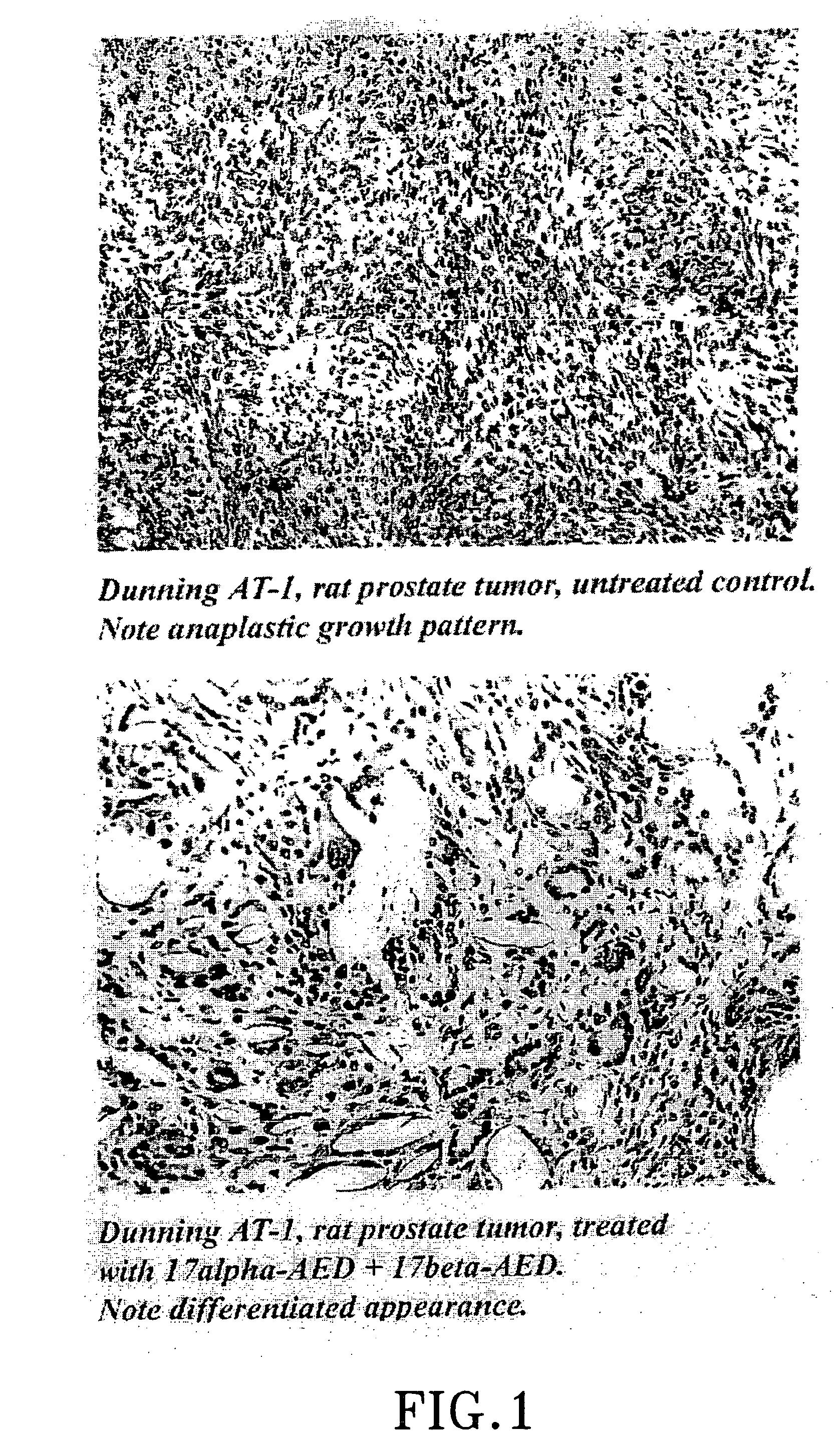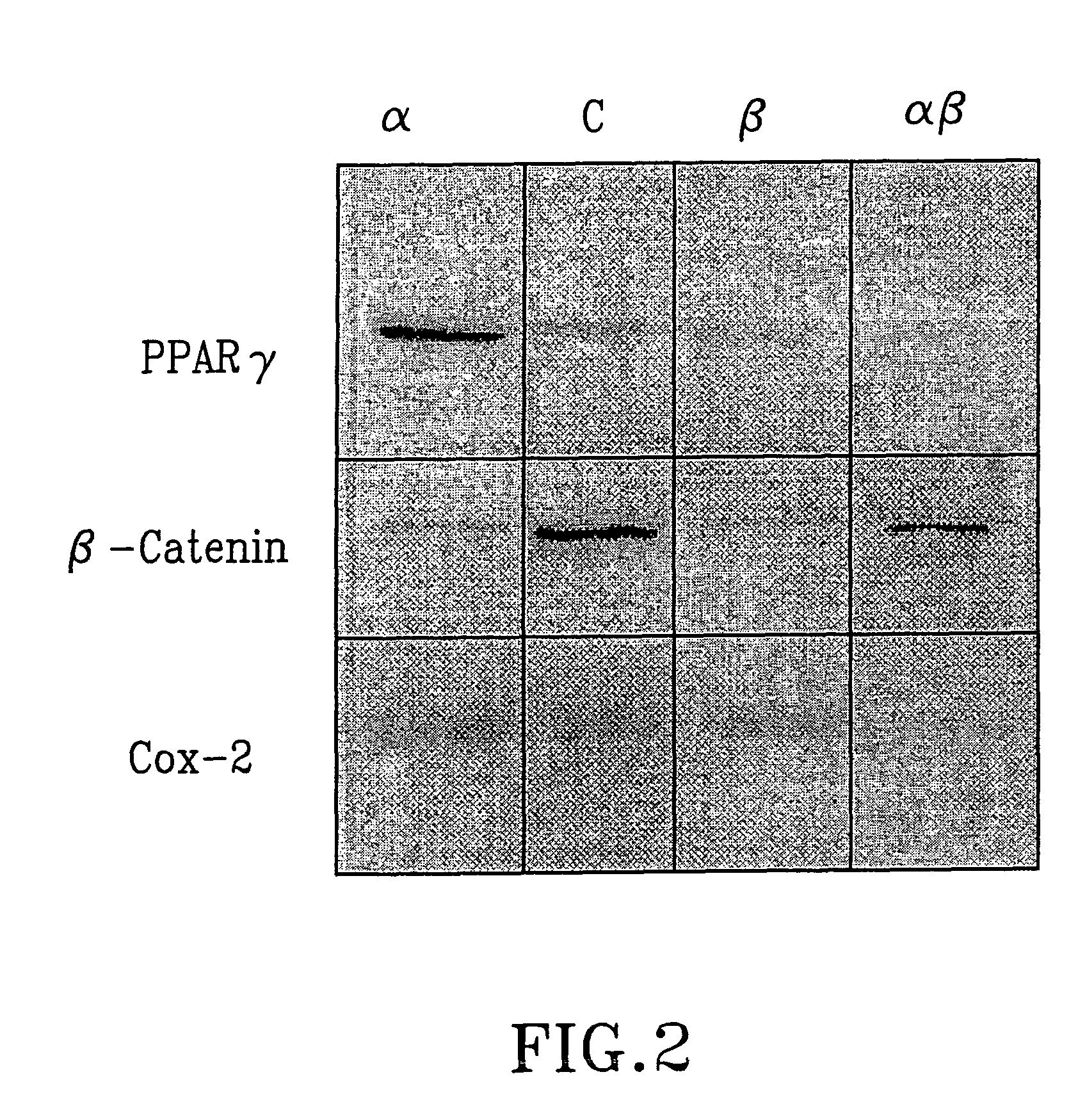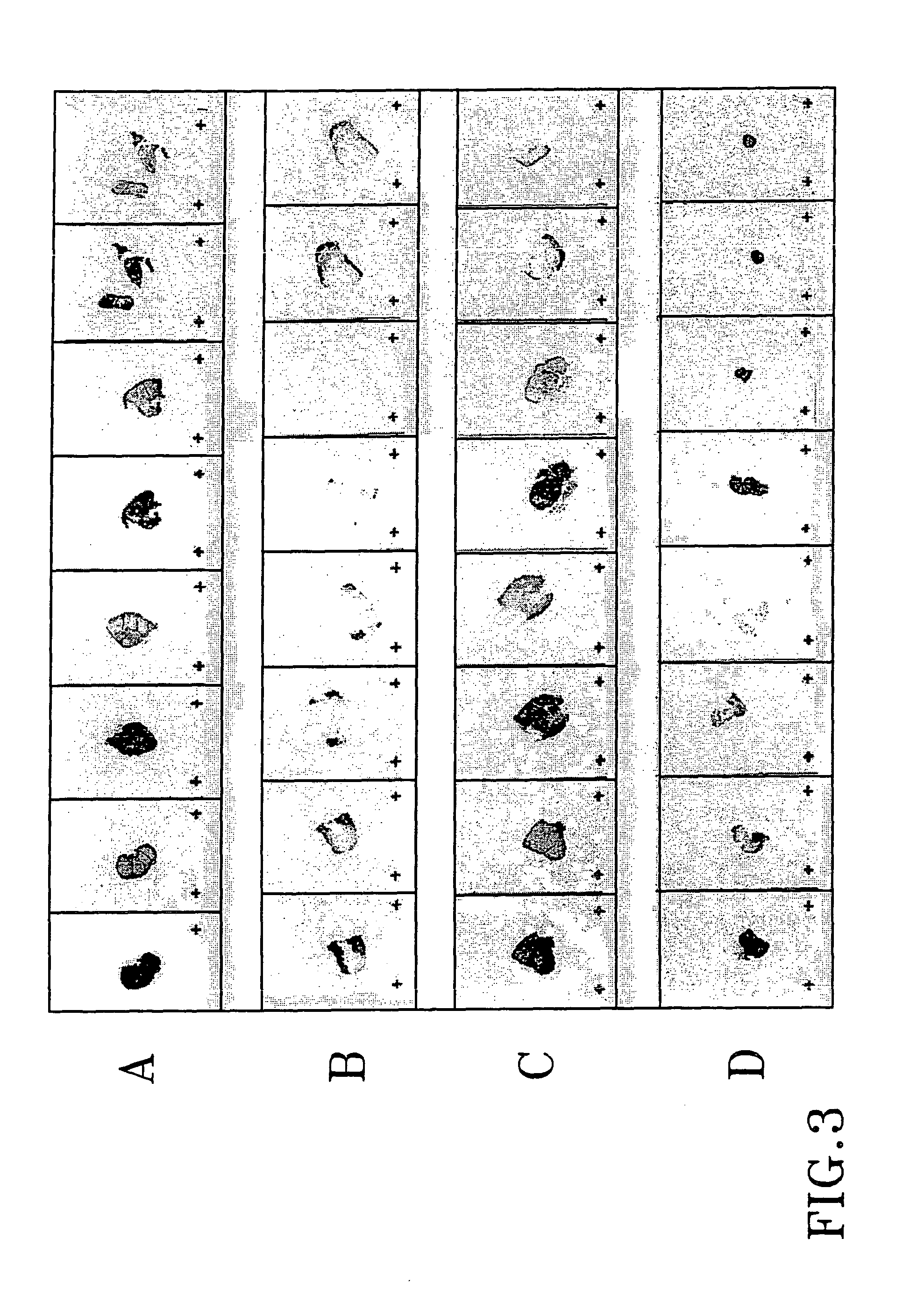Treatment of tumours
a tumour and treatment technology, applied in the field of steroid derivatives, can solve the problems that there is no apoptosis in the two breast cancer cell lines, and achieve the effect of squelching unwanted ppar-activity and increasing the efficacy of treatmen
- Summary
- Abstract
- Description
- Claims
- Application Information
AI Technical Summary
Benefits of technology
Problems solved by technology
Method used
Image
Examples
example 1
Synthesis of 3β,7β,17β-trihydroxy-androst-5-ene
[0067] In this experiment, 3β,7β17α-trihydroxy-androst-5-ene (compound 6) was prepared as shown in Scheme 1 below, wherein (a) is NaBH4, EtOH; (b) is Ac2O, pyridine, DMAP; (c) is t-BuOOH, Cu (I)I, acetonitrile; (d) is NaBH4, CeCl3*7H2O, EtOH; and (e) is KOH, MeOH.
Compound 2: 3β,17β-dihydroxy-androst-5-en
[0068] Compound 1 (1.00 g, 3.46 mmol) was dissolved in dry ethanol (15 ml) and NaBH4 (196 mg, 5.20 mmol) was added slowly. After 1 hour at room temperature aqueous NaOH (2M, 6 ml) was added carefully and the mixture was extracted three times with diethyl ether. The combined extracts were dried over MgSO4 and the solvent evaporated.
[0069] Yield: 91%.
[0070]1H-NMR (CDCl3, 400 MHz) 0.76 (s, 18-H), 1.05 (s, 19-H), 3.52 (m, 3α-H), 3.65 (t, 17α-H), 5.35 (d, 6-H)
Compound 3: 3β,17β-diacetoxy-androst-5-en
[0071] Compound 2 (880 mg, 2.93 mmol), pyridine (25 ml), acetic anhydride (2 eq.) and DMAP (10 mol %, 29 mg) were heated at 100° C. for...
example 2
Synthesis of 3β,3β,17α-trihydroxy-androst-5-ene
[0081] In this experiment, 3β,7β17α-trihydroxy-androst-5-ene (compound 12) was prepared as shown in Scheme 2 below, wherein (a) is t-butyldimethylsilyl chloride, imidazole, DMF; (b) is NaBH4, CeCl3*7H2O, EtOH; (c) is p-nitro-benzoicacid, PPh3, DEAD, toluene; (d) is tBuOOH, Cu (I)I, acetonitrile; and (f) is n-Bu4NF, THF, KOH, MeOH.
Compound 7: 3β-(Dimethyl-t-butylsiloxy)androst-5-en-17-one (Mitsunobu Reaction)
[0082] A solution of compound 1 (2.88 g, 10 mmol), imidazole (1.7 g, 25 mmol) and t-butyldimethylsilyl chloride (1.8 g, 12 mmol) in dry DMF (20 ml) was kept under argon over night, then poured into water extracted by chloroform and the solvent evaporated. Yield: 98%.
[0083]1H-NMR (CDCl3, 400 MHz) 0.06 (s, Me2Si), 0.88 (s, 18-H), 0.89 (s, tBu), 1.02 (s, 19-H), 2.41 (dd, 16-H), 3.50 (m, 3α-H), 5.37 (d, 6-H)
Compound 8: 3β-(Dimethyl-t-butylsiloxy),17β-hydroxy-androst-5-en
[0084] Yield: 92%.
[0085]1H-NMR (CDCl3, 400 MHz) 3.64 (t, 1...
example 3
Evaluation of Effects
Material and Methods
Animals 1
[0091] Viable tumour pieces of Dunning R 3327, AT-1, rat prostatic tumour, previously grown on Copenhagen-Fischer rats previously treated as follows were taken for investigation: Group 1 a single dose of 80 mg Δ5-androstene-3β,17β-diol (Sigma Chemicals) s.c. Group 2 and 3 a single dose of 10 mg of Δ5-androstene-3β,17α-diol, (Steraloid Inc.). Group 4 served as untreated, tumour-bearing controls. In all treatments equal amounts of PEG 400 (Sigma Chemicals) and ethanol, 0.5 ml was used as vehicle and injected s.c. adjacent to the tumour site.
[0092] After 96 hours group 3, previously treated with 10 mg of AS-androstene-3β,17α-diol, received a single injection of 80 mg of Δ5-androstene-3β,17β-diol in the same way as group 1.
[0093] In group 2 the experiment was terminated after 96 hours and for the remaining groups after 19 days through asphyxiation of rats with carbon dioxide. The local animal ethics committee had accepted the expe...
PUM
| Property | Measurement | Unit |
|---|---|---|
| excitation wavelength | aaaaa | aaaaa |
| excitation wavelength | aaaaa | aaaaa |
| concentration | aaaaa | aaaaa |
Abstract
Description
Claims
Application Information
 Login to View More
Login to View More - R&D
- Intellectual Property
- Life Sciences
- Materials
- Tech Scout
- Unparalleled Data Quality
- Higher Quality Content
- 60% Fewer Hallucinations
Browse by: Latest US Patents, China's latest patents, Technical Efficacy Thesaurus, Application Domain, Technology Topic, Popular Technical Reports.
© 2025 PatSnap. All rights reserved.Legal|Privacy policy|Modern Slavery Act Transparency Statement|Sitemap|About US| Contact US: help@patsnap.com



